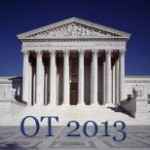Justice Ginsburg on Empowering Oral Argument
 An interview with Justice Ginsburg appears in the October issue of Elle magazine. In the article, Justice Ginsburg describes her first oral argument before the United States Supreme Court. Any advocate could relate to her story:
An interview with Justice Ginsburg appears in the October issue of Elle magazine. In the article, Justice Ginsburg describes her first oral argument before the United States Supreme Court. Any advocate could relate to her story:
I had, I think, 12 minutes, or something like that, of argument. I was very nervous. In those days, the court sat from 10 to 12, and 1 to 3. It was an afternoon argument. I didn’t dare eat lunch. There were many butterflies in my stomach. I had a very well-prepared opening sentence I had memorized. Looking at them, I thought, I’m talking to the most important court in the land, and they have to listen to me and that’s my captive audience.
Justice Ginsburg argued on behalf of Sharon Frontiero in Frontiero v. Richardson. In that case the Court held that the United States military could not differentiate on the basis of gender in how it provides benefits to service members’ families.
In the interview, Justice Ginsburg recounts that as she spoke before the Court during oral argument her confidence grew:
I felt a sense of empowerment because I knew so much more about the case, the issue, than they did. So I relied on myself as kind of a teacher to get them to think about gender.


